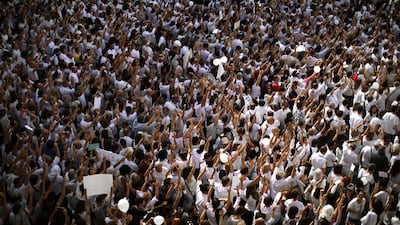Thousands rallied in Madrid and Barcelona on Saturday in a last-ditch call for both Spanish and Catalan leaders to stave off a national crisis amid Catalonia's threat to secede from Spain.
The demonstrations in the Spanish capital and the Catalan city of Barcelona were held simultaneously under the slogan "Shall We Talk?" in an effort to push lawmakers in both cities to end months of silence and start negotiating. The crowd wore white T-shirts and respected the organisers' call to not bring either Spanish or Catalan flags.
Catalonia's regional president, Carles Puigdemont, has vowed to make good on the results of last Sunday's disputed referendum on secession won by the "Yes" side. Spanish prime minister Mariano Rajoy has meanwhile warned the vote was illegal and promised that Catalonia is going nowhere.
Protesters packed Barcelona's Sant Jaume Square where the Catalan government has its presidential palace, shouting "We want to talk!" and holding signs saying "More Negotiation, Less Testosterone!" and "Talk or Resign!".
The gathering around Madrid's Cibeles fountain boasted a huge banner demanding that the respective leaders start talking. Some people chanted "Less hate, and more understanding!" and "Carles, Mariano, let's see if you can call each other."
Not far away in Madrid, there was a separate rally in Colon Square where thousands clamoured for the unity of Spain and against any attempt by the northeastern region of Catalonia to break away. The crowd bristled with Spanish flags, and some people danced in a fountain in the square.
_______________
Read more:
Spain court orders Catalan independence session suspended
Why the EU hasn't taken Madrid to task for its behaviour over the Catalan referendum
Independence movements gain traction from global crises
_______________
Tensions almost boiled over when a small group of people waving Spanish flags, apparently from the pro-union rally, began shouting at people at the pro-dialogue rally. Police quickly moved in to separate the two groups.
The calls for dialogue and unity come after a traumatic week in Spain, which began on Sunday with Catalonia's independence referendum. Riot police stormed several polling stations in an unsuccessful attempt to impede the vote, instead leaving hundreds of voters in need of medical attention.
Even though 2.2 million Catalan took part in the referendum despite the crackdown — with 90 per cent voting for independence — the vote polled less than half of the region's electorate. Mr Puigdemont declared he would seek a declaration of independence in the regional parliament anyway.
The referendum was followed by a strike on Tuesday across Catalonia to protest the police violence. Then came the stern message from Spanish King Felipe VI that the Catalan government and parliament were breaking the law.
But just when secessionist sentiment was at its high point, Mr Puigdemont and his separatist cohorts were struck a blow when Catalonia's top two banks, Caixabank and Banco Sabadell, as well as energy company Gas Natural announced they were relocating their headquarters from Catalonia to other parts of Spain. Other companies are also considering such a move to ensure that the possible secession of the region wouldn't immediately knock them out of the European Union and its lucrative common market.
The warnings sent by the business sector have coincided with the first calls from within Mr Puigdemont's government to hold off on a declaration of independence.
Santi Vila, Catalonia's regional chief for business, told Cadena SER Radio late on Friday that he's pushing for "a new opportunity for dialogue" with Spanish authorities.
"We have to give it one more chance, maybe the last chance, and perhaps the only way that can happen is to start with a ceasefire," Mr Vila said. "We can all calm down and give ourselves the opportunity to not take any decisions and see what channels we can open up to start a serene dialogue."
Mr Vila said he would like to see Spanish authorities return powers to the region which they have assumed in recent weeks, including control of a large part of its finances.
It's unclear how widespread Mr Vila's moderate position is inside the Catalan government, which is being pressured from separatist grass roots groups and the far-left party CUP to declare independence soon.
Separatist lawmakers had planned to discuss a secession plan on Monday this week, but that session in the regional parliament was suspended by Spain's constitutional court.
The focus has now shifted to this coming Tuesday, when Mr Puigdemont is set to address the regional parliament "to report on the current political situation" in Catalonia.
The most recent regional elections and polls taken before the referendum showed that the region's 7.5 million residents were roughly split on the divisive issue.
A pro-union protest has been called to take place in Barcelona on Sunday.

